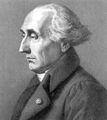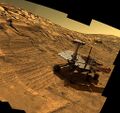Template:Selected anniversaries/January 25: Difference between revisions
No edit summary |
No edit summary |
||
| (37 intermediate revisions by the same user not shown) | |||
| Line 1: | Line 1: | ||
<gallery> | <gallery> | ||
||1627 | ||1627: Robert Boyle born ... chemist and physicist. Pic. | ||
|| | ||1640: Robert Burton dies ... priest, physician, and scholar ... best known for the classic ''The Anatomy of Melancholy''. Pic. | ||
|| | ||1726: Guillaume Delisle dies ... cartographer. Pic. | ||
|| | File:Joseph-Louis Lagrange.jpg|link=Joseph-Louis Lagrange (nonfiction)|1736: Mathematician and astronomer [[Joseph-Louis Lagrange (nonfiction)|Joseph-Louis Lagrange]] born. He will make significant contributions to the fields of analysis, number theory, and both classical and celestial mechanics. | ||
||1742: Edmond Halley dies ... astronomer, geophysicist, mathematician, meteorologist, and physicist. Pic. | |||
||1794 | ||1755: Paolo Mascagni born ... physician and anatomist. Pic. | ||
||1794: François-Vincent Raspail born ... chemist, physician, physiologist, and lawyer. Pic. | |||
||1812: William Shanks born ... amateur mathematician. Shanks is famous for his calculation of π to 707 places, accomplished in 1873, which, however, was only correct up to the first 527 places. This error was highlighted in 1944 by D. F. Ferguson (using a mechanical desk calculator). Pic search: https://www.google.com/search?q=William+Shanks+pi | |||
File:Charles Grafton Page.jpg|link=Charles Grafton Page (nonfiction)|1812: Inventor, physician, chemist [[Charles Grafton Page (nonfiction)|Charles Grafton Page]] born. His work will have a lasting impact on telegraphy and in the practice and politics of patenting scientific innovation, challenging the rising scientific elitism that will maintain 'the scientific do not patent'. | File:Charles Grafton Page.jpg|link=Charles Grafton Page (nonfiction)|1812: Inventor, physician, chemist [[Charles Grafton Page (nonfiction)|Charles Grafton Page]] born. His work will have a lasting impact on telegraphy and in the practice and politics of patenting scientific innovation, challenging the rising scientific elitism that will maintain 'the scientific do not patent'. | ||
||1843: Karl Hermann Amandus Schwarz born ... mathematician, known for his work in complex analysis. Pic. | |||
||1854: August Otto Föppl born ... engineer credited with introducing the Föppl–Klammer theory and the Föppl–von Kármán equations (large deflection of elastic plates). Pic. | |||
||1855: Mathematician and academic Karl Rohn born. He studied algebraic space curves and completed the classification work of Georges Halphen and Max Noether. Pic. | |||
||1858: Mikimoto Kōkichi born ... entrepreneur who is credited with creating the first cultured pearl and subsequently starting the cultured pearl industry with the establishment of his luxury pearl company Mikimoto. Pic. | |||
||1870: Niels Fabian Helge von Koch born ... mathematician who gave his name to the famous fractal known as the Koch snowflake, one of the earliest fractal curves to be described. Pic. | |||
||1878: Ernst Alexanderson born ... engineer ... TV. | |||
|| | ||1881: Thomas Edison and Alexander Graham Bell form the Oriental Telephone Company. Pics. | ||
|| | ||1894: Emil Weyr dies ... mathematician, known for his numerous publications on geometry. Pic. | ||
|| | ||1905: born: Leo Zippin ... mathematician. He is best known for solving Hilbert's Fifth Problem with Deane Montgomery and Andrew M. Gleason in 1952. Pic. | ||
||1908 | ||1908: Mikhail Chigorin dies ... chess player and theoretician. | ||
File:Alexander Graham Bell.jpg|link=Alexander Graham Bell (nonfiction)|1915: [[Alexander Graham Bell (nonfiction)|Alexander Graham Bell]] inaugurates U.S. transcontinental telephone service, speaking from New York to Thomas Watson in San Francisco. | File:Alexander Graham Bell.jpg|link=Alexander Graham Bell (nonfiction)|1915: [[Alexander Graham Bell (nonfiction)|Alexander Graham Bell]] inaugurates U.S. transcontinental telephone service, speaking from New York to Thomas Watson in San Francisco. | ||
||1917 | ||1917: Ilya Prigogine born ... chemist and physicist, Nobel Prize laureate. Pic. | ||
||1921 | ||1921: Samuel T. Cohen born ... physicist and academic. "Father of the atom bomb." Pic. | ||
||1923 | ||1923: Arvid Carlsson born ... pharmacologist and physician, Nobel Prize laureate, dopamine. Pic. | ||
||1926: Gaisi Takeuti born ... mathematician, known for his work in proof theory. His goal was to prove the consistency of the real numbers. To this end, Takeuti's conjecture speculates that a sequent formalisation of second-order logic has cut-elimination. Pic search: https://www.google.com/search?q=Gaisi+Takeuti | |||
||1935: Alfred Loewy dies ... mathematician who worked on representation theory. Loewy rings, Loewy length, Loewy decomposition and Loewy series are named after him. Pic: http://www.learn-math.info/mathematicians/historyDetail.htm?id=Loewy | |||
1947 | ||File:ENIAC Empty-Noise-Into Alien-Communication.jpg|link=ENIAC (SETI)|1940: ENIAC ("[[Empty Noise Into Alien Communication]]") uses [[scrying engine]] techniques to pre-visualize the [[Wow! signal (nonfiction)|Wow! signal]]. | ||
||1947: Al Capone dies ... gangster and mob boss. | |||
File:Cathode ray tube amusement device schematic.jpg|link=Cathode-ray tube amusement device (nonfiction)|1947: Thomas Goldsmith Jr. files a patent for a "[[Cathode-ray tube amusement device (nonfiction)|Cathode Ray Tube Amusement Device]]", the first ever electronic game. | File:Cathode ray tube amusement device schematic.jpg|link=Cathode-ray tube amusement device (nonfiction)|1947: Thomas Goldsmith Jr. files a patent for a "[[Cathode-ray tube amusement device (nonfiction)|Cathode Ray Tube Amusement Device]]", the first ever electronic game. | ||
||Sergey Ivanovich Vavilov | ||1951: Sergey Ivanovich Vavilov dies ... physicist, the President of the USSR Academy of Sciences from July 1945 until his death. Pic: Postage stamp. | ||
||1957 | ||1957: Kiyoshi Shiga dies ... physician and bacteriologist ... famous for the discovery of Shigella dysenteriae, the organism that causes dysentery, in 1897, during a severe epidemic in which more than 90,000 cases were reported, with a mortality rate approaching 30%. Pic. | ||
|| | File:Ayn_Rand_Shrugged_-_by_Sisyphus.jpg|link=Ayn Rand Shrugged|1957: Publication of '''''[[Ayn Rand Shrugged]]''''', a historical novel by Sisyphus about author Ayn Rand. | ||
||1960: Beno Gutenberg dies ... seismologist who made several important contributions to the science. He was a colleague and mentor of Charles Francis Richter at the California Institute of Technology and Richter's collaborator in developing the Richter magnitude scale for measuring an earthquake's magnitude. Pic. | |||
|| | ||1961: In Washington, D.C., President John F. Kennedy delivers the first live presidential television news conference. | ||
|| | ||1966: Saul Adler dies ... microbiologist and parasitologist. Pic. | ||
||1994 | ||1977: Friedrich Karl Schmidt dies ... mathematician, who made notable contributions to algebra and number theory. Pic. | ||
||1993: Five people are shot outside the CIA Headquarters in Langley, Virginia. Two are killed and three wounded. | |||
||1994: Mathematician and computer scientist Stephen Cole Kleene dies. Kleene contributed to the foundation of recursion theory, notably the study of computable functions. He also invented regular expressions. Pic. | |||
||1994: Spacecraft ''Clementine'' launched ... joint space project between the Ballistic Missile Defense Organization (BMDO, previously the Strategic Defense Initiative Organization, or SDIO) and NASA ... the objective of the mission was to test sensors and spacecraft components under extended exposure to the space environment and to make scientific observations of the Moon and the near-Earth asteroid 1620 Geographos. The Geographos observations were not made due to a malfunction in the spacecraft. Pic. | |||
File:Black Brant.jpg|link=Norwegian rocket incident (nonfiction)|1995: The [[Norwegian rocket incident (nonfiction)|Norwegian rocket incident]]: Russia almost launches a nuclear attack after it mistakes Black Brant XII, a Norwegian research rocket, for a US Trident missile. | File:Black Brant.jpg|link=Norwegian rocket incident (nonfiction)|1995: The [[Norwegian rocket incident (nonfiction)|Norwegian rocket incident]]: Russia almost launches a nuclear attack after it mistakes Black Brant XII, a Norwegian research rocket, for a US Trident missile. | ||
||2005 | ||1995: Albert William Tucker dies ... mathematician who made important contributions in topology, game theory, and non-linear programming. Pic. | ||
||2000: Herta Freitag dies ... mathematician known for her work on the Fibonacci numbers. Pic. | |||
File:Opportunity in Endurance Crater simulated view.jpg|link=Opportunity (nonfiction)|2004: Mars Exploration Rover ''[[Opportunity (nonfiction)|Opportunity]]'' lands on Mars and rolls into Eagle crater, a small crater on the Meridiani Planum. | |||
||2005: Philip Johnson dies ... architect, designed the PPG Place and Crystal Cathedral. Pic. | |||
||2009: Eleanor F. Helin dies ... astronomer. Helin was principal investigator of the Near-Earth Asteroid Tracking (NEAT) program of NASA's Jet Propulsion Laboratory, and a prolific discoverer of minor planets (see list) and several comets. Pic search yes: https://www.google.com/search?q=Eleanor+F.+Helin | |||
||2012: Franco Pacini dies ... astrophysicist and academic. In 1967 he published in Nature the first specific suggestion that strongly magnetized neutron stars could release their rotational energy and produce a large flow of relativistic particles. The discovery of pulsars in Cambridge (UK) proved the correctness of his hypothesis a few months later by Jocelyn Bell Burnell and Antony Hewish of University of Cambridge. Pic. | |||
|| | ||2014: Heini Halberstam dies ... mathematician and academic, working in the field of analytic number theory. He is one of the two mathematicians after whom the Elliott–Halberstam conjecture is named. Pic search: https://www.google.com/search?q=heini+halberstam | ||
|| | ||2014: John Robert Huizenga dies ... physicist who helped build the first atomic bomb and who also debunked Utah scientists' claim of achieving cold fusion. Pic search: https://www.google.com/search?q=john+huizenga | ||
|| | File:Dennis_Paulson_of_Mars.jpg|link=Dennis Paulson of Mars|2017: ''[[Dennis Paulson of Mars]]'' celebrates the thirteenth anniversary of the Mars Exploration Rover ''[[Opportunity (nonfiction)|Opportunity]]'' landing on Mars and rolling into Eagle crater. | ||
</gallery> | </gallery> | ||
Latest revision as of 09:04, 24 January 2022
1736: Mathematician and astronomer Joseph-Louis Lagrange born. He will make significant contributions to the fields of analysis, number theory, and both classical and celestial mechanics.
1812: Inventor, physician, chemist Charles Grafton Page born. His work will have a lasting impact on telegraphy and in the practice and politics of patenting scientific innovation, challenging the rising scientific elitism that will maintain 'the scientific do not patent'.
1915: Alexander Graham Bell inaugurates U.S. transcontinental telephone service, speaking from New York to Thomas Watson in San Francisco.
1947: Thomas Goldsmith Jr. files a patent for a "Cathode Ray Tube Amusement Device", the first ever electronic game.
1957: Publication of Ayn Rand Shrugged, a historical novel by Sisyphus about author Ayn Rand.
1995: The Norwegian rocket incident: Russia almost launches a nuclear attack after it mistakes Black Brant XII, a Norwegian research rocket, for a US Trident missile.
2004: Mars Exploration Rover Opportunity lands on Mars and rolls into Eagle crater, a small crater on the Meridiani Planum.
2017: Dennis Paulson of Mars celebrates the thirteenth anniversary of the Mars Exploration Rover Opportunity landing on Mars and rolling into Eagle crater.







